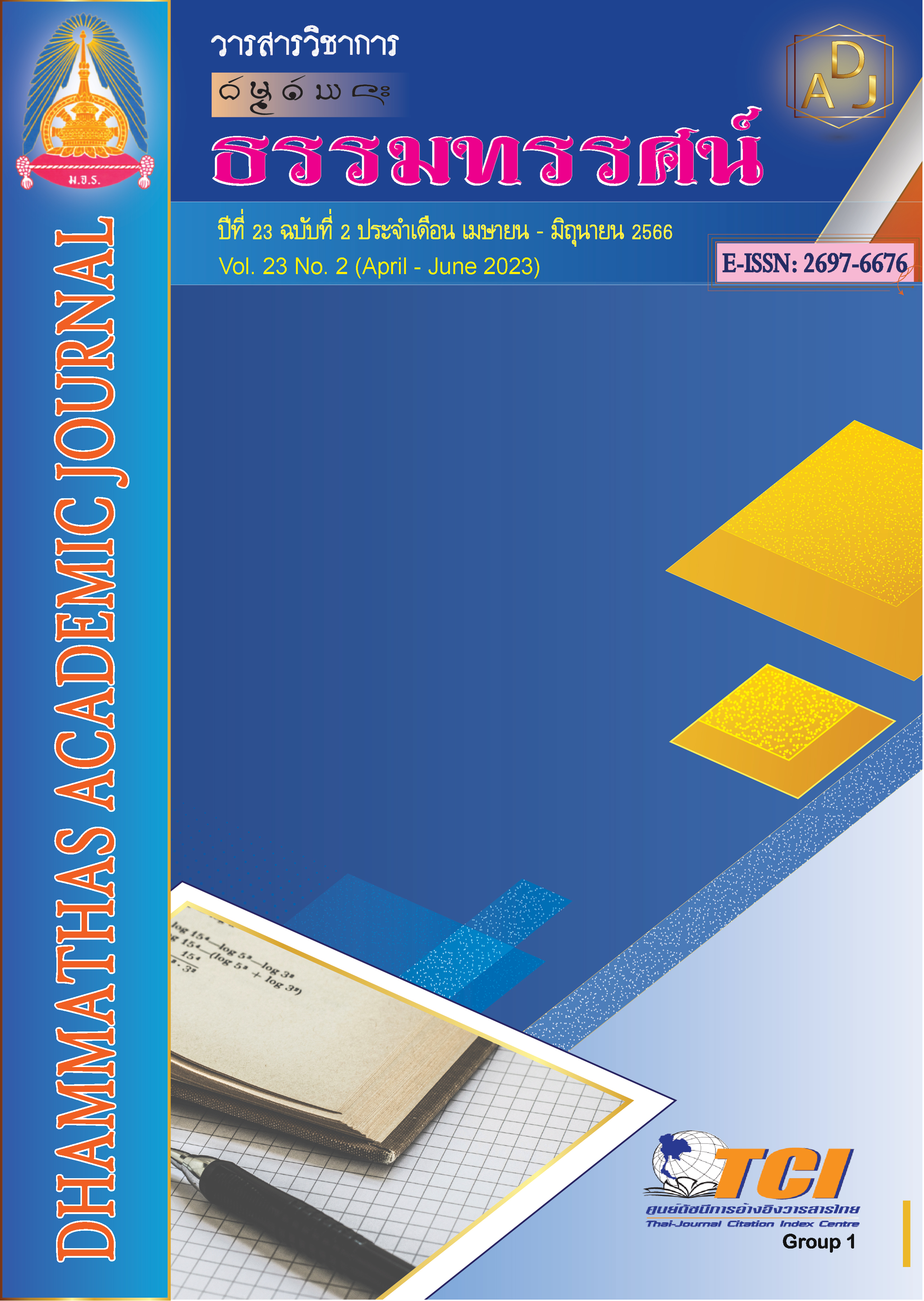Cultural Relations in Political Science for the Development of Democracy in Thai Society
Main Article Content
Abstract
This academic article aimed to present the principles of thought, relationship between Political Science, Political Culture and human rights for democratic development. The results of the study revealed that the concept of Political Science and Political culture relates to the activities of the state and the community. There are also influences of social factors, such as, culture will directly affect the behavior of people in society. Therefore, in order to understand the characteristics of man in society. It is necessary to understand behavior problems or phenomena that are important to joint activities related to state that affect most people in society. Its including beliefs values under democracy to build confidence and promote participation in Political activities with a participatory relationship between the state and society. It can be considered, therefore, that the relationship between Political Science principles and culture for the development of democracy can be developed together, and it is also the civilization of society according to the principles of democracy at more of international level. Further development of the quality of democracy to be strong.
Article Details

This work is licensed under a Creative Commons Attribution-NonCommercial-NoDerivatives 4.0 International License.
เพื่อให้เป็นไปตามกฎหมายลิขสิทธิ์ ผู้นิพนธ์ทุกท่านต้องลงลายมือชื่อในแบบฟอร์มใบมอบลิขสิทธิ์บทความ ให้แก่วารสารฯ พร้อมกับบทความต้นฉบับที่ได้แก้ไขครั้งสุดท้าย นอกจากนี้ ผู้นิพนธ์ทุกท่านต้องยืนยันว่าบทความ ต้นฉบับที่ส่งมาตีพิมพ์นั้น ได้ส่งมาตีพิมพ์เฉพาะในวารสาร วิชาการธรรม ทรรศน์ เพียงแห่งเดียวเท่านั้น หากมีการใช้ ภาพหรือตารางของผู้นิพนธ์อื่นที่ปรากฏในสิ่งตีพิมพ์อื่นมาแล้ว ผู้นิพนธ์ต้องขออนุญาตเจ้าของลิขสิทธิ์ก่อน พร้อมทั้ง แสดงหนังสือที่ได้รับการยินยอมต่อบรรณาธิการ ก่อนที่บทความจะได้รับการตีพิมพ์References
เกษียร เตชะพีระ. (2560). การเมืองวัฒนธรรม. เข้าถึงได้จาก https://www.matichonweekly.com/editor/article_41877
จรัส สุวรรณมาลา. (2557). วัฒนธรรมการเมืองท้องถิ่นในประเทศไทย. กรุงเทพฯ: จุฬาลงกรณ์มหาวิทยาลัย.
ชนิดา จิตตรุทธะ. (2556 ข). วัฒนธรรมปิระมิดกับการทำให้เป็นประชาธิปไตย. กรุงเทพฯ: จุฬาลงกรณ์มหาวิทยาลัย.
_______. (2559 ก). วัฒนธรรมพีระมิดกับการทำให้เป็นประชาธิปไตย. (พิมพ์ครั้งที่ 2). กรุงเทพฯ: จุฬาลงกรณ์มหาวิทยาลัย.
ธีระพงศ์ จิระภาคม. (2556). แนวทางการพัฒนาการปกครองระบอบประชาธิปไตยในประเทศไทย. กรุงเทพฯ: วิทยาลัยรัฐธรรมนูญ สำนักงานศาลรัฐธรรมนูญ.
ประจักษ์ ก้องกีรติ. (2558). การเมืองวัฒนธรรมไทย ว่าด้วยความทรงจำวาทกรรมและอำนาจ. นนทบุรี: ฟ้าเดียวกัน.
_______. (2566). Never Again: เปลี่ยนผ่าน ให้พ้นความรุนแรงและความยุติธรรมแบบไทยๆ ว่าด้วยความยุติธรรมในระยะเปลี่ยนผ่านการเมือง. เข้าถึงได้จาก https://www.the101.world/prajak-kongkirati-transitional-justice-interview/
ประโยชน์ ส่งกลิ่น. (2554). นโยบายสาธารณะยุคหลังสมัยใหม่. มหาสารคาม: วิทยาลัยการเมืองการปกครอง มหาวิทยาลัยมหาสารคาม.
พรอัมรินทร์ พรหมเกิด. (2557). วัฒนธรรมทางการเมืองกับการพัฒนาประชาธิปไตยในเขตชนบทอีสาน: กรณีศึกษา ประชาชนในเขตหมู่บ้านคำบง และหมู่บ้านสะอาด ตำบลสะอาด อำเภอน้ำพอง จังหวัดขอนแก่น. วารสารมนุษยศาสตร์สังคมศาสตร์ มหาวิทยาลัยขอนแก่น, 31(3), 63-96.
พฤทธิสาณ ชุมพล. (2550). ระบบการเมือง: ความรู้เบื้องต้น. กรุงเทพฯ: จุฬาลงกรณ์มหาวิทยาลัย.
วิฑูรย์ วีรศิลป์. (2556). วัฒนธรรมทางการเมืองของหัวหน้าส่วนราชการจังหวัดเพชรบูรณ์. (รายงานการวิจัย). เพชรบูรณ์: มหาวิทยาลัยราชภัฎเพชรบูรณ์.
วิทยากร เชียงกูล. (2552). แนวทางสร้างประชาธิปไตยทางการเมือง เศรษฐกิจ และสังคม. กรุงเทพฯ: สถาบันพระปกเกล้า.
วิศรุตา ทองแกมแก้ว. (2549). พัฒนาการวัฒนธรรมทางการเมืองไทย: จาก “ประชาธิปไตย เล่งลาน” สู่ “การปฎิรูปประเทศ”. สงขลา: คณะมนุษยศาสตร์และสังคมศาสตร์ มหาวิทยาลัยราชภัฎสงขลา.
วิศาล ศรีมหาวโร. (2554). การเมืองไทยระบบหรือคน: การพัฒนาวัฒนธรรมและการมีส่วนร่วมทางการเมืองของประชาชน. เข้าถึงได้จาก http://kpi2.kpi.ac.th/wiki/index.php/
สำนักงานเลขาธิการสภาผู้แทนราษฎร. (2561). การมีส่วนร่วมทางการเมืองในระบอบประชาธิปไตย. กรุงเทพฯ: สำนักงานเลขาธิการสภาผู้แทนราษฎร.
อริย์ธัช แก้วเกาะสะบ้า. (2559). วัฒนธรรมทางการเมืองแบบประชาธิปไตย. กรุงเทพฯ: สำนักงานวิชาการ สำนักงานเลขาธิการสภาผู้แทนราษฎร.
Pye, L. W. (2000). Democracy and Its Enemies. In James F. Holifield & Calvin Jillson (Eds.), Pathway to Democracy: The Political Economy of Democratic Transitions. New York: Rout ledge.

